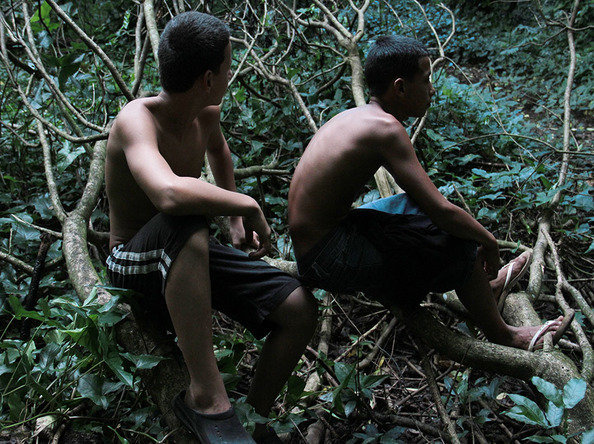Beatriz Santiago Munoz
dal 20/2/2013 al 20/4/2013
Segnalato da
20/2/2013
Beatriz Santiago Munoz
Gasworks Gallery, London
The Black Cave. Consisting of newly commissioned moving image works, the exhibition focuses on the relationship between landscape, history and infrastructure in the artist's home country of Puerto Rico.

Gasworks presents The Black Cave, the first UK solo exhibition by Beatriz Santiago Muñoz. Consisting of newly commissioned moving image works, the exhibition focuses on the relationship between landscape, history and infrastructure in the artist’s home country of Puerto Rico.
Often documenting her interactions with specific individuals and communities, Santiago's films and videos focus on how social relations are embodied in particular places and gestures. Drawing from anthropology and experimental theatre, the artist develops her work together with the people she portrays, using performance and re-enactment as strategies for self-representation. Her previous works range from an interview with controversial Puerto Rican artist Carlos Irizarry, subsequently interpreted through dance, to an observational documentary about the routine tasks of present-day anarchist communities in San Francisco.
For her exhibition at Gasworks, Santiago has produced two new works that explore the contemporary landscape of Puerto Rico through an historical lens. The video La Cueva Negra (2013) investigates the transformation of a former archaeological site, whereas the 16mm film Farmacopea (2013) looks at how distinctive features of the island’s natural landscape relate to the development of agriculture and tourism.
La Cueva Negra concentrates on the Paso del Indio, an indigenous burial site that was discovered twenty years ago during the construction of a highway. Informed by interviews with the archaeologists and labourers that worked on the excavation, as well as regular interactions with a couple of local boys now living there, this video unravels the material and symbolic history of the site through first-hand accounts, performance and play. In this way, Santiago builds an experimental cosmogony from the layers of trash, the graffiti, the expressway, the karst bedrock, the traces of previous inhabitants’ worldviews, and the impressions of the people living there now.
Farmacopea, on the other hand, looks at how the Puerto Rican landscape has been transformed and de-historicised by tourism and the service industry. The film focuses on particular plant species, such as the Hippomane mancinella (or Manchineel tree), also known as "the little apple of death". This is one of the most toxic plants in the world and indigenous communities are said to have once used its sap to poison their arrow tips. In more recent years however, the Puerto Rican government has sought to eradicate it, greatly transforming the ecology of coastal areas. With Farmacopea, Santiago explores how this desire to render the landscape harmless contributes to the self-image that Puerto Rico wilfully promotes: an idyllic, tropical Caribbean island that somehow stands outside of history and politics.
Using different strategies, the works in The Black Cave recuperate images and understandings of the Puerto Rican landscape that have quite literally been buried beneath a growing infrastructure of transport and tourism.
--
Events
Artist's Talk and Group Listening Session
Monday 25 February, 7pm at Gasworks
Beatriz Santiago Muñoz discusses her practice and the development of The Black Cave with Gasworks’ exhibitions curator Robert Leckie. This is followed at 8pm by a group listening session focusing on the artist’s personal collection of music about landscape.
Screening Programme
Dates and venue TBC – please check back here for updates.
El Puente (The Bridge, 1954, 50min)
Directed by Amílcar Tirado
El Puente portrays a rural community in Puerto Rico struggling to cope with the devastation of an overflowing river which threatens to derail their children’s schooling.
Reassemblage (1982, 40min)
Directed by Trinh T Minh-Ha
Reassemblage was filmed in Senegal as part of a three year work on ethnographic field research in West Africa. In the film, Trinh explains that she intends "not to speak about/Just speak near by," her subjects, unlike in more conventional ethnographic documentary film.
De Cierta Manera (One Way or Another, 1977, 78min)
Directed by Sara Gómez
De Cierta Manera is a Cuban romantic drama that focusses on the poor neighbourhoods of Havana shortly after the 1959 Cuban revolution. The film mixes documentary-style footage with fiction to illustrate the history and problems of the post-revolutionary development process in Cuba, demonstrating how tearing down slums and building modern settlements does not necessarily or immediately change the culture of the inhabitants.
Sabado de Mierda (Saturday of Shit, 1985-87, 25min)
Directed by Gregorio Rocha with Sarah Minter
Sábado de Mierda is a semi-documentary film that focuses on the lives of the mierdas punks ("Shit Punks") gangs in the Ciudad Nezahualcóyotl (or "Neza York") suburb of Mexico City in the 1980s.
Prisoner's Cinema (2013/in production)
Directed by Beatriz Santiago Muñoz
Prisoner's Cinema centres on a conversation with Elizam Escobar, a Puerto Rican artist and writer who was convicted for political offenses against the United States and spent nearly 20 years in more than 12 prisons. In the video, Escobar narrates his experience of place, from dream-space to prison-space. Over time the conversation turns to how the experience of prison time is for him the determining dimension in the de-humanizing nature of imprisonment.
Preview: 21 February, 6.30 - 9pm
Gasworks Gallery
155 Vauxhall Street, London
Hours: Wed-Sun, 12-6pm or by appointment
Free Admission



